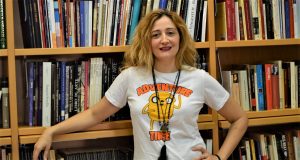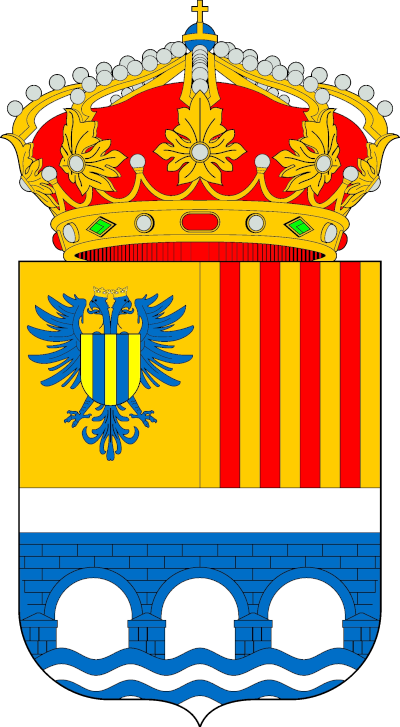
Over recent months the exceptional health measures have dominated the news, added to which we have the start of the new school year, so we thought that Ana Gallart was the ideal person to interview for this edition of the BIM.
In her professional life she works as a financial administrator in a recycling company, while politically Gallart is in charge of the areas of Education, Health, Tourism and Municipal swimming pool.
First of all, we would like to know what led to your involvement in local politics?
It’s something which I have always been interested in; however I never found the right moment to get involved. Until one day “a certain person”, very close to me and with very similar ideologies, suggested it to my friend and colleague Mario and myself and I said: “Why not?”
The idea of working for your village, getting to know it better and being involved in its management attracted me.
It’s just over a year since you took responsibility for Education and Health, two areas which have been really affected by the COVID-19 crisis. From the point of view of a councillor, how has the situation developed since the declaration of the state of emergency in March.?
During the whole period my colleagues and I have had numerous meetings, in which we looked at how the situation was affecting our village in order to be able to deal with its effects. When the school closed, I was in constant contact with the head teacher of the CEIP Benicadim, Vicent Molines, and school council meetings were held when necessary to deal with the situation.
Amongst other things, money which came to us from Social Services to help the most vulnerable people was used to buy face masks and sanitising gel (both things were very hard to get hold of at the start of the pandemic) for the village.
We also saw that the children were the unwitting victims of the situation, they couldn’t go out into the streets for a long time, so we organised the “Happy birthday”. The parents of the children celebrating a birthday during the lockdown contacted us and our police visited the child at home with a loud speaker and played the ‘happy birthday’ song. It was very satisfying being able to organise something like this, not only for the police who saw the happiness on the children’s faces and in their eyes, but also for me. Also, thinking still of the children, we bought some activity books “Now we are at home” for the infant and junior children, something aimed at encouraging creativity and reflection and supporting their education. The books were available from the library.
Although attendance was not as in previous years, at least this year you were able to organise the Summer School. How was this done while adhering to the safety measures?
At the beginning we didn’t know whether to organise it or not. We had emerged from a hard lockdown and it seemed risky to organise it. In addition, some parents seemed to think the same. But, on the other hand, we thought that it was something that the children and families needed. Of course children need to spend time with other children and, clearly, some parents were due to go back to work. Grandparents were not the best option in this situation, in spite of the importance of the unconditional support they always give to their families.
At the Summer School we followed the protocol and prevention measures given by the Conselleria and Ministerio de Sanidad. Two bubbles were created, respecting the safety distance, taking temperatures, using sanitising get etc. Apart from this we had two teachers, Joan y Sheila, who knew most of the children and the project. Also, as in other years, the children were able to use our pool, one group went on Thursdays and the other on Fridays, always respecting protocol.
The pool eventually opened, although with limited access, opening times and exceptional health measures. How do you evaluate this?
Yes, the pool was also one of the difficult decisions this year. At the start, we didn’t know whether we could open or not, we had to wait for the COVID protocols which were arriving every day, although we knew that it was an important activity for the village. We made the necessary changes to meet the protocol (taking on an extra lifeguard, more control of the water, taking the temperature of the users at the entrance, making available sanitising gel, controlling numbers of users etc.) and it worked well all season. Of course some people missed the day pass, but we had to have strict control over numbers and the only way to do this was with a season pass.
We are now seeing how each school is adapting in one way or another to the return to normality. How is the resumption of school at CEIP Benicadim?
During the lockdown we were in contact with CEIP Benicadim and IES Pedreguer for anything which they needed. And as the school year starts up again too. This start will be different given the situation. We are making sure that protocols are being followed, cleaning of the school has been intensified and, through the head teacher and the teaching staff, everyone is being informed about the start up, with bubbles, division of space and following the guidelines set by the Conselleria and Ministerio de Sanidad. Now Beniarbeig has a school which can guarantee compliance with all of the COVID measures, as it is a big new building where there are no issues of lack of space for the children.
One of the main demands by families at the school has been the installation of an air conditioning system for the school, a proposal which you also made in your electoral programme. What stage is it at?
Yes, new schools are equipped with heating but not with air conditioning and, of course, in many geographical areas of Spain there is more need for something to lower the temperature than for heating. Here, in Beniarbeig, during the school year the heating isn’t used much but air conditioning with a cold setting is necessary. We know about this need and we can assure everyone that this year we will be installing air conditioning in the classrooms.
In respect of university and further education students, the Town Hall has some transport grants. What do they consist of and how can they be accessed?
As you say, they are grants destined to cover transport costs which our young students might incur when they go to study outside the village. We think it’s an important investment and a bit of help for families with students. Soon the Town Hall will be publishing the call and the conditions for applying for transport help for university and further education students for 2020/21. Keep an eye on the social media, web, notice boards etc.
It seems that, for the time being, Beniarbeig isn’t one of the areas most affected by the pandemic, but we have seen that in towns and villages around the level of infection has led to local loockdowns. What do the Health Authorities in Denia say about this?
The situation in our area is very different now to how it was months ago as far as the level of infection is concerned. Tourists arrived in the area and this, along with some antisocial behaviour, has led to an increase in the number of cases. Every Friday since the start of the pandemic we have been having meetings by videoconferencing with the Hospital Comarcal de Salud Pública Marina Salud and all the Town Halls of the Marina Alta during which we are informed of the number of weekly infections, hospitalisations and, generally, the situation in the area.
Of all the areas for which you are responsible, tourism must be the one with the least work at the moment as, apart from the impact of COVID-19, Beniarbeig isn’t a village linked directly to tourism. But what is happening at a local level?
Exactly, this year the area of tourism is not top priority due to the situation. However, last year it was much more satisfying, for example in November we attended the V Feria Comarcal con los 5 sentidos in Ondara, at which we promoted our village, in particular the summer solstice at the cueva Bolumini, a spectacular experience, respecting of course our environment and nature. We held the first Feria Gastronómica last October, organised by the councillor for culture, to continue promoting local gastronomy and local business. Of course we hope to organise more projects to promote our village.


